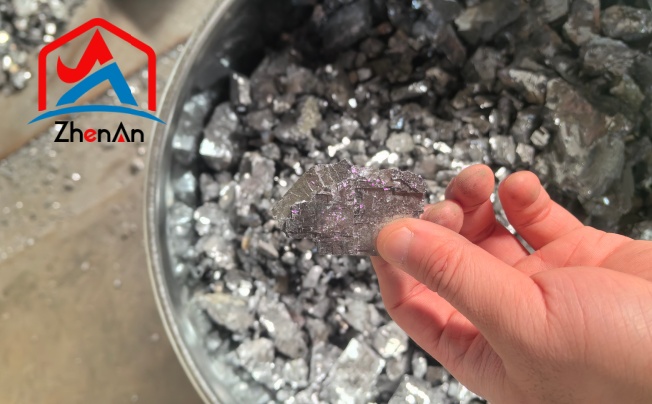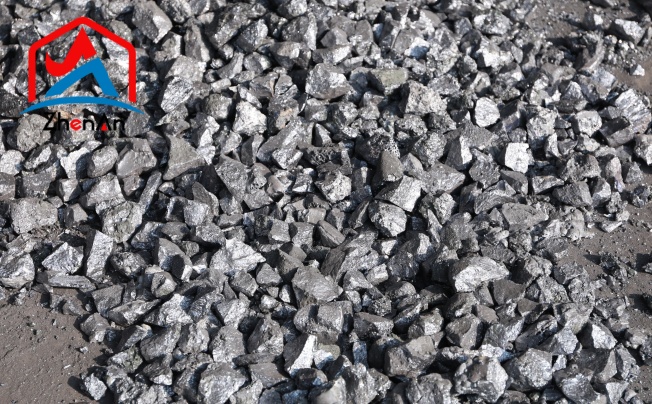Composition and Properties
Ferrosilicon is an alloy composed primarily of iron (Fe) and silicon (Si), typically containing around 15-90% silicon by weight. The exact composition can vary depending on the intended application, with varying levels of other elements such as manganese, carbon, and aluminum also present in smaller quantities.
The high silicon content gives ferrosilicon its unique properties, including excellent corrosion resistance, high thermal conductivity, and good magnetic properties. Its composition allows for precise control over the alloy's characteristics, making it a versatile material for a wide range of industrial applications.
In terms of physical properties, ferrosilicon is typically a solid material with a metallic luster and a dark grey color. It has a relatively high density due to its iron and silicon content, which contributes to its weight and stability in various processes.
The alloy exhibits brittleness at room temperature but can be ductile when heated to certain temperatures. Ferrosilicon is also known for its ability to readily absorb oxygen from the atmosphere, forming oxides on its surface that can impact its performance in certain applications.
Methods for Measuring Specific Gravity
Archimedes' Principle
Archimedes' Principle, a fundamental concept in physics attributed to the ancient Greek mathematician, offers a reliable method for determining the specific gravity of ferrosilicon. This principle states that the buoyant force acting on an object immersed in a fluid is equal to the weight of the displaced fluid.
When applied to ferrosilicon, this principle involves carefully measuring the change in weight when the material is submerged in a liquid of known density. By calculating the ratio of these weights, one can ascertain the specific gravity with remarkable precision.
To employ Archimedes' Principle in measuring specific gravity, a specialized apparatus is utilized. A balance or scale capable of high-precision measurements is essential, as even slight discrepancies can impact the accuracy of results.
The ferrosilicon sample is first weighed in air and then immersed in a liquid such as water or oil with a precisely determined density. The observed difference in weight provides valuable data for calculating specific gravity using this venerable scientific principle.
Pycnometer Method
The Pycnometer Method stands out as another robust technique for determining the specific gravity of ferrosilicon with exceptional accuracy and reliability. A pycnometer—a specialized glass container with precise volume markings—is employed to encapsulate and measure both solid and liquid substances accurately.
In this context, it serves as an indispensable tool for analyzing the density and specific gravity of materials like ferrosilicon. When using the Pycnometer Method for measuring specific gravity, meticulous attention to detail is paramount.
The pycnometer must be thoroughly cleaned and dried before introducing any samples to prevent contamination or erroneous readings. The process involves filling the pycnometer with a reference fluid (commonly distilled water) at a known temperature and weighing it accurately—an initial step crucial for subsequent calculations.
By carefully introducing pre-weighed ferrosilicon samples into the pycnometer filled with reference fluid without entrapping air bubbles, researchers can ensure precision throughout each measurement cycle. By recording both empty pycnometer weights and those containing samples, precise determinations of specific gravity can be made using established formulas based on mass differentials.
Significance of Specific Gravity in Quality Control of Ferrosilicon Production
Ensuring Consistency in Material Properties
Specific gravity plays a crucial role in maintaining the quality and consistency of ferrosilicon production. By accurately measuring the specific gravity of ferrosilicon, manufacturers can ensure that the material properties remain within the desired parameters.
Consistency is key in industrial processes where even slight variations in specific gravity can lead to significant differences in the final product's performance. By monitoring and controlling the specific gravity throughout the production process, manufacturers can guarantee that each batch meets the required standards for composition, density, and other essential characteristics.
Impact on Performance in Industrial Applications
The specific gravity of ferrosilicon directly affects its performance in a wide range of industrial applications. For instance, in alloy manufacturing, such as steelmaking, precise control over specific gravity is vital to achieving the desired strength, hardness, and corrosion resistance properties.
Similarly, in the construction industry, where ferrosilicon is used in heavy concrete production for infrastructure projects, ensuring an optimal specific gravity helps enhance durability and structural integrity. The impact of specific gravity on performance extends beyond material properties to operational efficiency and cost-effectiveness, making it a critical parameter for quality control.
Fostering Innovation Through Specific Gravity Analysis
In addition to quality control and performance optimization, analyzing specific gravity data opens doors to innovation and advancement in ferrosilicon production. By studying how variations in specific gravity impact material properties and application performance, researchers can identify new opportunities for enhancing product quality or developing novel uses for ferrosilicon.
For example, by understanding how different compositions affect specific gravity and subsequent characteristics like magnetism or thermal conductivity, scientists can explore innovative applications across industries ranging from electronics to renewable energy technologies. Embracing detailed analysis of specific gravity not only ensures current standards are met but also paves the way for future breakthroughs in materials science.
Applications and Implications of Specific Gravity Data
Alloy Manufacturing: Enhancing Steel Quality
In the realm of alloy manufacturing, the specific gravity of ferrosilicon plays a crucial role in enhancing the quality and performance of steel. Ferrosilicon is commonly used as a deoxidizing agent in steelmaking processes due to its ability to remove impurities such as oxygen and sulfur.
By accurately measuring the specific gravity of ferrosilicon, manufacturers can ensure precise control over the composition of the alloy, resulting in steel with improved strength, durability, and corrosion resistance. This data is vital for maintaining consistent product quality and meeting strict industry standards.
Construction Industry: Reinforcing Heavy Concrete Structures
Specific gravity data for ferrosilicon holds significant importance in the construction industry, particularly in applications involving heavy concrete production. Ferrosilicon is utilized as an aggregate material in heavyweight concrete mixes due to its high density and ability to increase mass without compromising structural integrity.
By precisely measuring the specific gravity of ferrosilicon aggregates, construction engineers can design concrete formulations that meet stringent load-bearing requirements for projects such as bridges, dams, and nuclear facilities. This data ensures that heavy concrete structures exhibit superior strength and durability while withstanding extreme environmental conditions.






